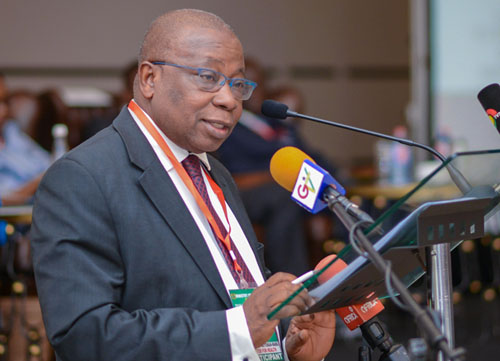Kwaku Agyeman-Manu
Minister of Health, Kwaku Agyeman-Manu has called on Members of Parliament (MPs) to play their role in promoting health and health equity.
“We must strive to bridge inequities in access to health care within the populations we serve. Our role in legislation, budget allocation, oversight and ratification of international agreements provides the impetus for us to influence and prioritise health security,” he stated.
Speaking at the WHO and Inter-Parliamentary Union African Parliament High Level Conference on strengthening health security preparedness in Parliament, the Health Minister said when this is done well, it will provide Health Ministries with the groundwork necessary to build strong and resilient health systems that can provide care to everyone.
“I, therefore, encourage all my colleague MPs to diligently guide their respective health ministries and participate actively in pandemic preparedness planning, and also use various platforms to get regular updates from their ministries on the process of the pandemic accord, and also promptly ensure that when it is adopted, the countries will ratify it locally and support its implementation.
“We all have an important role to play in keeping our countries, Africa, and the World safe, and I call on all MPs to take the lead role in ensuring this,” he entreated.
According to him, it is the responsibility of countries to ensure core public health capacities are in place to prevent, detect and respond to outbreaks and health emergencies, and to set the foundation for a resilient health system to enable the attainment of Universal Health Coverage.
Speaker of Parliament, Alban S.K. Bagbin, said Ghana’s response to the COVID-19 pandemic showcased the power of a legislative framework, with laws like the Public Health Act 2012 and the Imposition of Restrictions Act 2020 at the forefront.
In a speech read on his behalf by the First Deputy Speaker, Mr. Bagbin noted that these not only provided legal basis for movement restrictions and safety measures but also catalysed our national response.
He, however, said this was not enough and called for the health systems to be made sustainable, well-financed, and constantly monitored.
For him, this conference presents a golden opportunity for parliamentarians to strengthen their legislative and policy-making roles in health security preparedness.
The Speaker said recent events had showcased the power of parliamentary intervention in health emergencies.
“Take the childhood vaccine shortage, for instance. Recognising the gravity of the situation, our esteemed parliament acted promptly, summoning the Health Minister, Mr. Kwaku Agyeman-Manu, upon the request of the minority.
“This action underscores our commitment to safeguarding the health of our children and ensuring the continued availability of essential health services,” he intimated.
He said similarly, in the face of the closure of the Renal Unit of the Korle-Bu Teaching Hospital, parliament once again rose to the occasion.
“The Minister of Health was summoned to appear before parliament on November 9, 2023, to provide clarity and accountability on this critical issue.
“It is through such direct actions that we demonstrate our role in maintaining the health security of our nation, ensuring that our health infrastructure is robust and responsive to the needs of our citizens,” he said.
Mr. Bagbin stated that these recent examples were a testament to the diligence and commitment of Ghana’s parliament in times of health crises.
Other speakers at the programme were Dr. Matshidiso Moeti, WHO Regional Director for Accra; Dr. Ahmed Al Mandhari, WHO Regional Director for the Eastern Mediterranean; and Martin Chungong, IPU Secretary General.
By Ernest Kofi Adu, Parliament House


